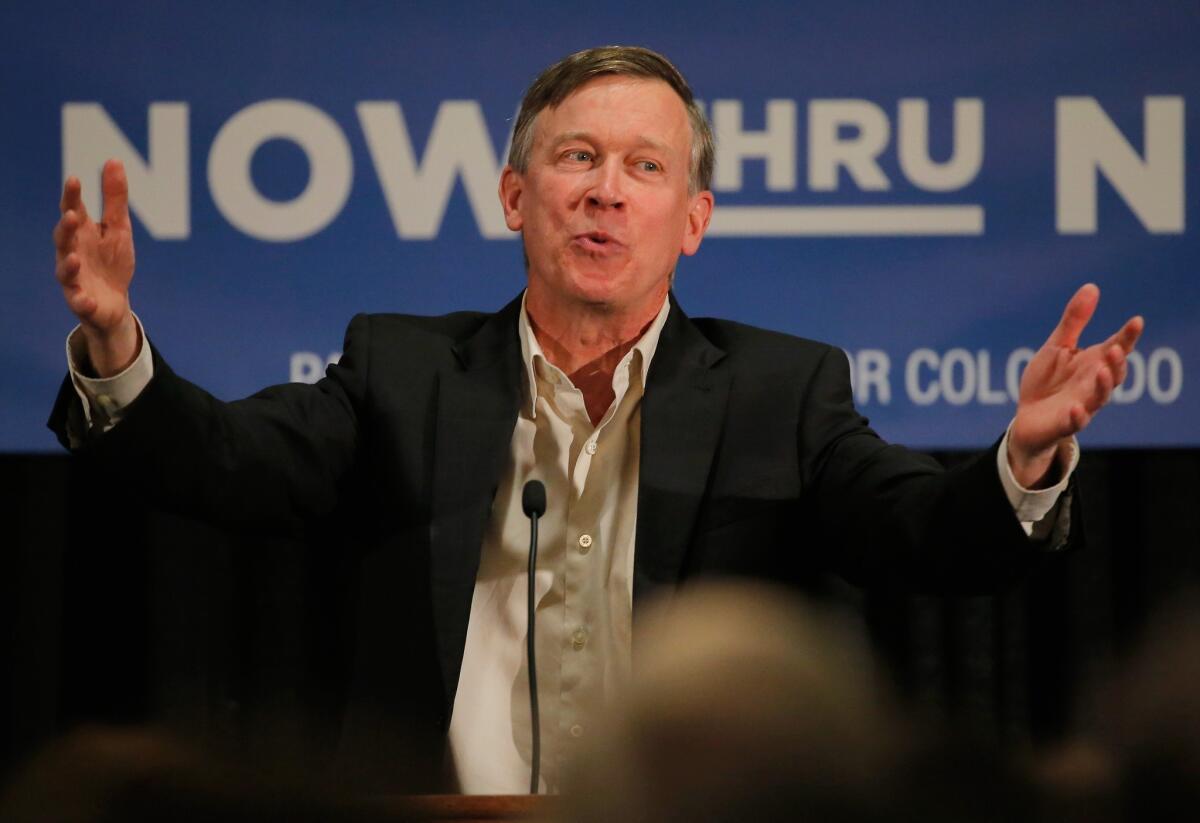Colorado governor says no regrets in death penalty case

- Share via
If Colorado Gov. John Hickenlooper is defeated Tuesday night, he’ll largely have himself to blame.
The once vastly popular Democrat has fallen so far in public esteem that he faces a serious threat from a less-than-world-beating challenger, former GOP Rep. Bob Beauprez. (Even some Republicans lacked enthusiasm when Beauprez launched his candidacy, remembering his previous run for governor, in 2006, when he lost by 17 percentage points.)
Part of Hickenlooper’s problem has been the ambitous liberal agenda, from gays to guns, he signed into law in 2013 after a Democratic legislative spree. Part has been his habit of thinking out loud and his seeming eagerness to please all sides of an issue; a meeting this summer with hostile sheriffs turned into a political disaster when the governor equivocated about the gun-control laws he backed, upsetting both sides.
But Hickenlooper will also have someone else to blame: Nathan Dunlap.
In 1993, as a 19-year-old, Dunlap killed four people -- three of them also teenagers -- at a Chuck E. Cheese pizza restaurant in Aurora, where he once worked. A fifth shooting victim survived.
In 2013, as Dunlap’s execution date neared, Hickenlooper granted “an indefinite reprieve,” lasting as long as he remains in office.
The move outraged the families of some victims and launched a thousand soft-on-crime TV ads this election season.
“Ladies and gentleman, it’s time you have a governor who looks out for the rights of the citizens and especially the victims,” Beauprez said, taking up the theme at a recent GOP rally in Colorado Springs.
Beauprez has vowed that Dunlap will be executed if he is elected.
But Hickenlooper is unmoved. “I don’t think government should be killing people who are no danger to society, no risk to society,” he said in an interview, in which Hickenlooper brought up the Dunlap case unbidden.
He said Dunlap -- whom he referred to at one point as a “monster” -- would undoubtedly die in prison.
“Somehow the attacks... intentionally leave that out, say Hickenlooper’s thinking of commuting his sentence and setting him free,” the governor said between gulps of takeout chicken soup, the antidote to a bad cold. “Never.”
Hickenlooper ran for governor the first time in 2010 as a supporter of capital punishment, but changed his position in office.
Asked if he would issue a reprieve for Dunlap again today, knowing the political consequences, Hickenlooper said he would, though he “would certainly talk about it differently and do the process differently.”
The abundance of media coverage and political advertising suggest “that everyone wants this guy dead, especially the families [of] victims, where that’s really not the case,” Hickenlooper said, citing some who have supported the governor and publicly stated a preference that Dunlap spend the rest of his life in prison.
“I might... have done a better job to make sure both sides were heard,” Hickenlooper said.
It was the closest he came to any second thoughts.
More to Read
Get the L.A. Times Politics newsletter
Deeply reported insights into legislation, politics and policy from Sacramento, Washington and beyond. In your inbox twice per week.
You may occasionally receive promotional content from the Los Angeles Times.











